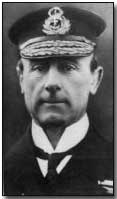Who's Who - Sir John Jellicoe
 Sir John Rushworth Jellicoe (1859-1935)
was Britain's best-known Admiral at the start of the war.
Sir John Rushworth Jellicoe (1859-1935)
was Britain's best-known Admiral at the start of the war.
Born on 5 December 1859 in Southampton, he joined the Royal Navy in 1872 and served in the Egyptian War of 1882.
In the years prior to the war Jellicoe served as Director of Naval Ordnance from 1905-7, and Controller of the Navy from 1908-10. Churchill, then First Lord of the Admiralty, appointed Jellicoe second-in-command of the Grand Fleet in November 1911.
Jellicoe was Admiral Fisher's long-standing choice to lead the grand fleet in wartime, a long-time assistant of Fisher's in the modernisation of the navy, and was accordingly appointed its commander on 4 August 1914, replacing Sir George Callaghan.
Jellicoe's defensive, cautious approach to naval warfare contrasted markedly with a wider public expectation of a major naval battle in the North Sea. In this respect Jellicoe was unfavourably compared with his eventual successor, Admiral Beatty.
However, the Royal Navy's primary task was to maintain an economic blockade of Germany; in this Jellicoe was rather more successful, holding a strategic advantage over the German High Seas Fleet, largely because of his unwillingness to risk and lose warships.
Jellicoe's performance at the Battle of Jutland in 1916 was viewed with disappointment by many, even as half-hearted, and his decision to turn away as a precautionary measure from suspected torpedo attack at the height of the battle came in for particular criticism. He was placed under some pressure to resign.
Instead Jellicoe was appointed First Sea Lord - effectively naval chief of staff - towards the close of 1916, replacing Sir Henry Jackson. He was uncomfortable in the role, little understanding its political dimension. He opposed the introduction of convoys for merchant shipping but worked to devise other anti-submarine measures.
Abruptly removed from office by Prime Minister David Lloyd George on Christmas Eve 1917 in a disagreement over the introduction of convoys in the Battle of the Atlantic, Jellicoe retired from active service, taking up the post of Governor General of New Zealand after the war from 1920-24.
Jellicoe published numerous books following the war, including The Grand Fleet 1914-16 (1919) and The Crisis of the Naval War (1921).
Sir John Jellicoe died on 20 November 1935 and is buried in the crypt of St. Paul's Cathedral.
Click here to read Jellicoe's official report following the Battle of Jutland.
A 'Wibble-Wobble' was slang for tanks.
- Did you know?
